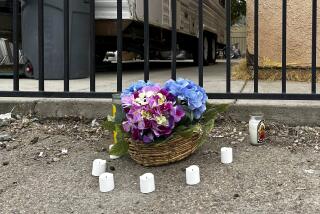Blood Samples Sought From 4 Youths Charged in Tay Slaying
- Share via
ORANGE — Prosecutors are seeking blood samples from four juveniles charged in the slaying of honor student Stuart A. Tay to compare the results to blood found at the crime scene, defense attorneys said Friday.
Defense attorneys said samples are needed to determine the origin of splattered blood found in the garage of a Buena Park residence where police say Tay was bludgeoned with a baseball bat. Tay’s body was later found buried.
Deputy Dist. Atty. Lewis R. Rosenblum said he could not discuss the case because of the age of the youths charged in the case.
Abraham Acosta, 16; Charles Bae Choe, 17; Mun Bong Kang, 17, and Kirn Young Kim, 17, have all pleaded not guilty in the case. A hearing to determine whether the youths should be tried as adults was postponed Friday to Feb. 23.
Robert C. Chan, 18, the alleged ringleader of the New Year’s Eve slaying, also is facing murder charges. Chan is being prosecuted separately as an adult because he had already turned 18 at the time of the slaying.
Attorney Angela Oh, who is representing Choe, said background evaluations on all the juveniles are expected to be completed before the so-called fitness hearing, where a judge will decide whether the youths should be tried as adults.
Defense attorneys hope to use the evaluation results to bolster their efforts to keep the proceedings in Juvenile Court, where murder penalties are less severe.
The hearing is an unusual one in which the burden is on defense attorneys to prove that their clients can be rehabilitated as juveniles. Prosecutors, meanwhile, are trying to prove that the severity of the crime and the sophistication with which it was carried out warrant that the teen-agers be tried as adults.
“We’re going in with the presumption running against us,” Oh said. “This is a very tough proceeding.”
Teen-agers convicted of murder in Juvenile Court can be held in the California Youth Authority until they turn 25. Prosecutors must then petition the court to keep the individuals in custody longer.
If convicted of murder in adult court, teen-agers can be sentenced to the maximum penalty of life in prison without the possibility of parole, Oh said. Juveniles are not eligible for the death penalty under state law, she said.
More to Read
Sign up for Essential California
The most important California stories and recommendations in your inbox every morning.
You may occasionally receive promotional content from the Los Angeles Times.













